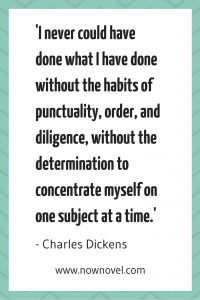'My writing sucks' is easy to tell yourself, but this is a story that all too often ends in writer's block. Instead, use these 7 tips to find a way through self-doubt and just write your novel:
- List what you need to improve and create your own boot camp
- Keep realistic expectations of your first draft
- Add freewriting to your daily writing practice
- Get thoughtful advice on how to improve your writing
- Remember that many celebrated authors had rocky roads to success
- Write 'blind'
- Build a SMART plan to improve your writing
Let's delve a little further into these ideas:
1: List what you need to improve and create your own boot camp
If you often ask yourself 'why is my writing so bad?' you're not alone. Self-doubt plagues many creative people. Creating is sometimes a challenging process, and it is easy to be self-critical, especially if you have a perfectionist streak.
Take a proactive approach: List the things you like least about your writing at your current level. A list might look like this:
- My characters don't feel three-dimensional
- It feels like my characters are living in a hazy, undefined place
- My dialogue reads as stilted and unexciting
Then create a boot camp for yourself wherein you will focus on improving in each of these areas. If, for example, you are finding your characters frustratingly 'thin', practice the important elements of character creation.
Every day for a week, write a paragraph or two describing a new character. Describe their appearance, their greatest fears, desires, and motivations. For inspiration, as you go, collect good character descriptions you come across.

For example, here is Dickens describing the clerk Wemmick in Great Expectations:
'I found him to be a dry man, rather short in stature, with a square wooden face, whose expression seemed to have been imperfectly chippped out with a dull-edged chisel. There were some marks in it that might have been dimples, if the material had been softer and the instrument finer, but which, as it was, were only dints.'
If it's place that lacks definition in your writing, choose a different room or location to describe every writing session. Use the senses - what does it look and smell like? Does it evoke relaxation or fear? Nostalgia or a sense of contemporary possibility?
Similarly, if you feel the dialogue in your writing sucks, create a plan for improving. Set yourself exercises.
For example, watch a TV show or movie that has excellent dialogue and attempt to write down a key conversation. How do screenwriters keep dialogue engaging? Conflict and contradiction are two key elements. Let characters butt heads sometimes. Micro tensions keep a story's pace speeding along.
Here are more ways to overcome the feeling your writing sucks:
2: Keep realistic expectations of your first draft
If you've been thinking 'my novel sucks', there might be something not working. Review your outline (or create an outline for what you've written so far if you tend not to outline in advance). Stepping outside of particulars and detail and taking an eagle's eye view of your story for a moment often helps.
Perhaps your expectations of your first draft are simply too high. You're allowed to have weak characters or hazy settings for the time being. As Chuck Wendig points out, even a NaNoWriMo novel, while supposedly a 'complete' manuscript, is best seen as the first step in a series of focused revisions.
Remember that a first draft has one purpose: Telling a story from start to finish. Think of your first draft as a skeleton. Your first revision when your draft is complete will give it a beating heart, skin and clothes.
3: Add freewriting to your daily writing practice
What is freewriting? It's a useful exercise for toning your figurative writing muscles. Freewriting means writing on a chosen subject without self-editing for the 'right' word or phrase. Typically, you set a timer, giving yourself a fixed period of time to write (e.g. 15 minutes). Simply write everything that comes into your head down on the page, no matter how awkward or clumsy it seems.
The important part of freewriting is not to stop until your time is up. Don't give yourself the chance to think 'my writing sucks' - let the self-critique come later. Try it. Open a book, close your eyes and land your finger on a word. Take the closest noun in the sentence. Write 500 words inspired by this one word without stopping.
4: Get thoughtful advice on how to improve your writing
Even the great authors have editors and first readers they rely on to provide insightful, external perspectives on their work. Some pundits say you should never get feedback until you're finished your novel's first draft, but everyone's process is different.
The truth is an external source of encouragement and ongoing insight can also help you focus more intently on your objectives. A writing coach or partner will nudge you when you stray a little far from your story's primary threads and hold you accountable to your own writing goals.
5: Remember that many celebrated authors had rocky roads to success

It's easy to think your writing is bad if you're comparing yourself to extremely accomplished authors. Remember, too, the rocky starts many published authors have persevered through. J.K. Rowling's Harry Potter fantasy series may have sold more than 450 million copies worldwide to date, but Rowling was turned down by eight publishers before Bloomsbury took interest.
Many lauded authors also only started publishing later in life. Nobel-winning author Toni Morrison published her first novel, The Bluest Eye, in 1970 when she was 39. Morrison went on to have a celebrated career and has published ten more novels to date in a writing career spanning 45 years.
6: Write 'blind'
A simple way to keep going when you're prone to merciless self-editing is to write 'blind'. Change the font colour in your word processor to the same colour as the background, so that you can't see what you're writing on the page.
This will mean you miss any spelling errors and typos. The advantage, though, is you will have less distraction and temptation to scrutinize every sentence for something to change. You can change the colour back when your writing session is over.
7: Build a SMART plan to improve your writing
To overcome self doubt and stop telling yourself 'my writing sucks', you need a plan for perfecting your craft.
A SMART plan is Specific, Measurable, Attainable, Realistic and Time-based. For example, 'Write 500 words every day for a week, within 45 minutes to an hour.'
You might choose an element of craft to make your focus area every week (e.g. characterization or place description). Or join a writing group and get constructive feedback. Whatever you do, actively work at building your writing skill and confidence. At the same time you'll build determination and perseverance.
Want to improve your writing? Join Now Novel and get constructive feedback from our community and/or your very own writing mentor.










I've written so much about my characters I have no idea about any of those points. I'm not even willing to write about anyone else, if it is even possible for me to get away from them. Perhaps, I just realized, I could take my memoir about my horses and put it into novel form. My first horse certainly was a character. After all, Kipling's short story, "The Maltese Cat", was from the horse's point of view. Love that one.
Njn - Almost 9 years ago
Hi Njn, didn't know that fact about Kipling. Thanks for reading and sharing your view!
Bridget At Now Novel - Almost 9 years ago
This was a fantastic, inspiring, and helpful read. I have nothing but the utmost respect for writers because I know how hard it is and how discouraging it can be. I find myself constantly looking online for advice as well as book recommendations too. I feel that this a craft that needs to be constantly worked on and I can never learn too much about it. I recently read a book that has literally changed me as a writer. You and your readers must read “Creative Visualization for Writers” by Nina Amir (http://ninaamir.com/). It answers the questions about one’s own writing that you may never even think to, or moreover, know how to ask. Nina Amir must have taken a hard look at her own writing to come up with something so outwardly helpful for the writing community as a whole. And to think that so many other untapped literary works could now be a reality thanks to this handbook of sorts? This book is a gem of immeasurable proportions; to give the gift of beautiful writing is one that cannot be taken back. One would be remiss not to at least give this work of art a once-over. I really hope you will check it out. I would love to hear your opinion!
Deborah Starling - Almost 9 years ago
Hi Deborah. Thank you for the recommendation, will do.
Bridget At Now Novel - Almost 9 years ago